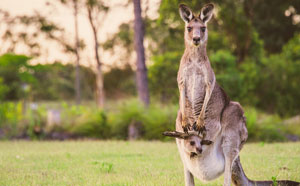
Providing food and water for wildlife is often done with the best of intentions. However, whether you’re concerned for their welfare or simply trying to get closer to an animal, offering food and water is putting these animals at risk.
Some of the issues caused by feeding wildlife include:
- Dependency on humans for survival as they rely on food provided and lose the ability to find food for themselves. This is particularly so if they are juveniles who should be learning to find their natural food.
- Sickness and deformities due to high quantities of salt present in bread and processed foods.
- Weight issues due to high quantities of fat present in processed food and meat.
- Dietary imbalances and severe deficiencies can be brought on by feeding (e.g. raw meat is lacking in calcium and has high levels of phosphorous).
- Increase in aggression and stress as many try to feed or drink together.
- Spreading disease through a concentration of food and animals in large numbers in one place.
- Bacteria from artificial water sources that become stagnant can be unsafe for animals and spread sickness easily. Did you know that kangaroos around Yellagonga Regional Park absorb most of their water needs through food? Luckily, there’s a permanent natural water source in the park if they need it so there is no need to supplement with buckets of water.
- Increase in the quantity of non-native animals, rodents and insects, as the more food they get the more they breed.
- Changing the balance of species in the wild as it can increase some species, which in turn, decreases others.
Nature provides everything they need to survive and thrive so please refrain from feeding our wildlife food and water.
Find out more about what you can do if you see sick or injured wildlife, or wildlife being purposefully fed.
How you can help protect wildlife
It’s easy to enjoy and protect wildlife without interfering.
Create your own wildlife habitat at home to attract birds, reptiles, amphibians and insects that you can observe. Grow native plants that provide nectar-rich flowers, fruits and leaves that wildlife feed on, and in time will provide them with shelter. Leave out a clean, freshly filled bird bath to help attract native birds.
With fewer tree hollows available in suburbia, consider building a nesting box in your backyard for local birds or animals. Different animals require different types of boxes so it’s a good idea to investigate the animals that visit your area and the types of homes they require.
Take the time to visit nature reserves and national parks. Yellagonga Regional Park and Yanchep National Park are both wonderful spots to observe kangaroos and many species of wetland and bushland birds.
Protect our wildlife by keeping your cats contained, dogs on leash while walking in wetlands and bushland areas, and driving carefully.
And lastly, get your wildlife fix by volunteering with a wildlife conservation organisation. There are opportunities to help sick and injured wildlife return to the wild, plant out areas to help native fauna flourish, survey birds and more.
Two local groups worth contacting include Friends of Yellagonga Regional Park and Woodvale Waters Friends of Beenyup Channel Group. Volunteering opportunities may also be available directly with the City.